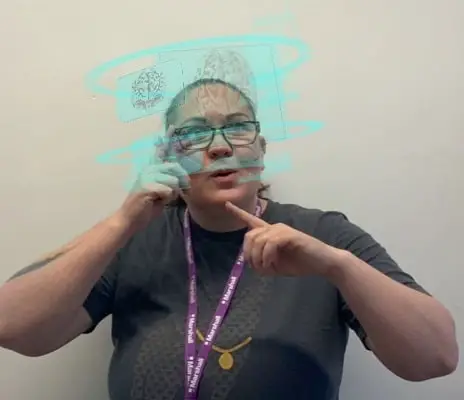Day in the life of
Content and Search Strategist – Joshua Feinberg

I’m a content and search strategist for small business CEOs — with 22 years of experience developing, implementing, and optimizing full-funnel, content-centric search marketing strategies.
And I am 31x certified by HubSpot Academy, including in SEO, Digital Advertising, Content Marketing, and Inbound Marketing.
I’m a former Microsoft Corporation content provider for and an advisor to the Small Business Server (SBS) product teams and small business channel partner teams in Redmond, Washington. I’ve led marketing for a venture-based B2B SaaS company that’s applying AI in the accounting and enterprise finance space.
My Typical Day
My workday starts with my morning workout — weights, stretching, and either walking or elliptical. During my workout, at least three or four days a week, I’m catching up on work-related podcasts or listening to work-related YouTube videos and webinar recordings.
Next, I look over my email inbox and LinkedIn messages for anything overnight that needs to be addressed ASAP. Then I jump over into my calendar and project management system to start working on projects for the day.
My search marketing strategy clients each get a series of three workshops along with buyer persona research, ideal client profile (ICP) definition, keyword research, buyer’s journey mapping, competitor analysis, and a content audit.
From the raw research, I’ll end up with very detailed buyer persona documents — typically around six to eight pages each.
Then from each buyer persona, I’ll create a content calendar planning out working titles for blog posts and videos going out six months at a time.
For lead generation and sales cycle acceleration, I’ll also plan out working titles for covering the full buyer’s journey (awareness, consideration, and decision) for each buyer persona.
When selecting topics for search strategy, first zero in on the persona’s goals and challenges. Then figure out how that intersects with the client’s business goals. And finally, consult a keyword research tool to assess monthly search volume and the degree of difficulty for ranking.
Question: Do you perform any technical SEO or off page SEO or content creation for clients or are you largely doing buyer personas, content planning, and keyword research?
No, I don’t do much technical SEO — aside from addressing issues flagged in Google Search Console or HubSpot’s SEO recommendations.
Most of the clients I work with aren’t big enough to have enough overall digital marketing budget to subspecialize within organic search.
There’s almost always a massive content deficit and lead nurturing deficit that needs to be addressed before stepping on the gas with any SEO or SEM.
Website usability (and overall content staleness and tone-deafness) is also often a barrier that impacts search if left unchecked.
So yes, I get heavily involved in content creation after buyer personas, content planning, and keyword research are completed.
Key point
You can’t be a search strategist for small businesses without owning content strategy — unless it’s an exceptionally mature, highly-commoditized company (in other words, on a collision course with Amazon) — which would make a lousy client anyway due to poor unit economics. When a potential client can’t articulate a SMART goal tied to revenue growth (leads, opportunities, new clients, MRR/ARR), there comes a point where I disqualify a prospect as a bad fit because I don’t chase vanity metrics.
Someone pursuing a career as a Search Marketing Strategist should look carefully at (a) who else will be on their team and (b) who is leading the team. Otherwise, it’s like getting traded to a Major League Baseball team with very little talent in the infield, outfield, starting rotation, and bullpen. Digital marketing is very much a team sport. Search strategy can only get you so far if the other key pieces aren’t in place to set you up for success.
Pros
As a content and search strategist for small businesses, I can significantly impact each client’s differentiation, thought leadership brand, competitive positioning, sales cycle acceleration, and revenue growth.
And you never get bored. Especially when working with B2B technology clients (mostly IaaS, SaaS, and Fintech), their industries change incredibly fast. While search marketing — organic and pad — changes ever faster.
When it comes to B2B technology companies, you will, by definition, work with larger marketing teams as a dedicated SEO strategist can’t get very far without a content team (copywriter, editor, graphic designer, and video producer), as well as a martech/email/CRO specialist and a paid search specialist.

Organic search results in Google
Cons
When working with non-marketers (small business owners, entrepreneurs, and founders), you need to spend a lot of time on education and managing expectations. Non-marketers many times have wildly unrealistic expectations around time to results and costs/investments.
Many are also relatively new to balancing search vs. content, organic search vs. paid search, search vs. social — and even why content and user experience matter more than just about anything.
When it comes to B2B technology companies, you will, by definition, get a lot of interest from companies whose business models aren’t strong enough to afford paid search and paid social — and are looking for you to perform SEO miracles in wildly unrealistic timeframes.
Advice to students looking to get into SEO
My advice for students:
Learn and apply content marketing and SEO to achieve meaningful business goals:
Take the free HubSpot Academy Content Marketing certification course.
Take the free HubSpot Academy SEO certification course.
Use what you learned in the content marketing training to start your own YouTube channel, which repurposes into a podcast, which repurposes into a blog.
(This should include creating buyer personas, performing keyword research, researching and pursuing link-building opportunities, and creating pillar content pages.)
So you gain experience creating and ranking video content, audio content, and text content. This will also force you to get comfortable with buying a domain, configuring a content management system/blog (the new HubSpot CMS Starter version; the only expense of anything I recommended ~$25/month) would be perfect for this), as well as configuring Google Analytics and Google Search Console.

Google Analytics
In terms of content, I love to double-dip. So if you were to focus on interviewing SEO Strategists that are 5-10 years ahead of you career-wise, you’d create a video/podcast/blog that’s growing your industry connections for job opportunities. At the same time, you’d become the practitioner implementing content-focused SEO with an amazing portfolio to share.
As you gain more confidence, I’d also recommend that you learn either/both of Semrush and/or Ahrefs.
In terms of your classes in school, if there are classes that cover digital marketing, there will almost certainly be some coverage of SEO.
However, just as important, business writing and multimedia journalism would serve you very well as you’ll want to be in a position to hire/manage content creators either as employees and/or freelancers to advance your SEO strategist career.
Side note: Just last week, for my podcast I interviewed a product marketing manager that I’ve known for years. At the start of the interview, he shared that it was him seeing me speak at a SCORE/HubSpot User Group event back in 2015 (I think the topic of my session was how to use content/inbound to differentiate and scale revenue) — while he was still a junior in college, inspired him to go into a digital marketing career. Made my week to hear that!
SEM Strategists
employ search marketing tactics to increase visibility and engagement with content, products, or services in Internet-enabled devices or interfaces. Examine search query behaviors on general or specialty search engines or other Internet-based content. Analyze research, data, or technology to understand user intent and measure outcomes for ongoing optimization.







.jpg)